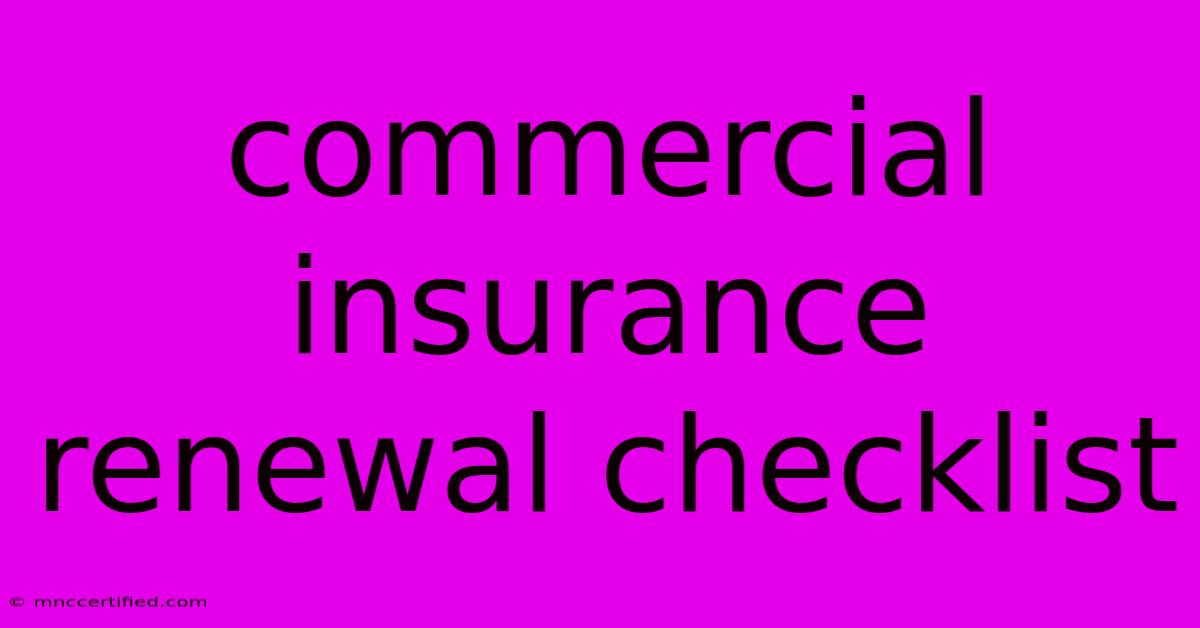Commercial Insurance Renewal Checklist

Table of Contents
Commercial Insurance Renewal Checklist: What to Review Before You Renew
Renewing your commercial insurance policy is a crucial task for any business owner. It ensures you have the necessary coverage to protect your assets and your business from unforeseen events. However, simply signing on the dotted line without careful consideration can lead to costly mistakes and gaps in coverage. This comprehensive checklist will guide you through the essential steps to ensure your renewal process is thorough and effective.
1. Review Your Current Policy
Before diving into the renewal process, start by thoroughly reviewing your current policy.
- Identify the Key Coverage:
- General Liability: Protects against claims of bodily injury, property damage, and other liabilities arising from your business operations.
- Property Insurance: Covers damage or loss to your business property, including buildings, equipment, and inventory.
- Workers' Compensation: Covers employees' medical expenses and lost wages in the event of work-related injuries or illnesses.
- Business Income Insurance: Provides coverage for lost income if your business is temporarily shut down due to a covered event.
- Professional Liability (Errors & Omissions): Protects your business from claims arising from professional negligence or mistakes.
- Check Coverage Limits: Ensure the limits on your existing policies are still adequate for your current needs. Have your business grown significantly? Have you taken on new risks? These factors might require adjusting your coverage limits.
- Deductibles: Review your deductibles and consider whether they are still appropriate. Higher deductibles can often result in lower premiums, but remember that you will bear the cost of the first portion of any claim.
- Exclusions and Limitations: Pay close attention to any exclusions or limitations in your policy. These are specific situations or circumstances that are not covered by the insurance.
2. Assess Your Business Changes
Business environments are constantly evolving. Make a list of any significant changes your business has undergone since your last renewal:
- New Locations: Opening new locations necessitates updating your coverage to include these new properties.
- New Equipment or Inventory: Purchasing new, expensive equipment or increasing your inventory levels requires adjusting your property insurance coverage.
- Changes in Operations: Any changes in your business operations, such as expanding into new markets or offering new services, may impact your insurance needs.
- Employee Changes: Increasing your workforce or hiring new employees may require adjusting your workers' compensation coverage.
- New Regulations or Compliance Requirements: Stay informed about any new industry regulations or compliance requirements that may impact your insurance coverage.
3. Gather and Analyze Financial Records
Accurate financial records are essential for determining the right coverage limits and premiums.
- Income and Expenses: Review your income and expenses for the past year to identify any trends or changes that might influence your insurance needs.
- Assets: Ensure your insurance coverage reflects the current value of your business assets, including property, equipment, and inventory.
- Liabilities: Review any outstanding liabilities, such as loans or mortgages, to ensure you have sufficient coverage in case of a claim.
4. Research and Compare Quotes
Don't settle for the first quote you receive. Shop around and compare quotes from different insurance providers.
- Request Quotes: Contact multiple insurance companies and provide them with all the necessary information about your business.
- Compare Coverage: Carefully compare the coverage offered by each provider, making sure you understand the terms and conditions.
- Analyze Premiums: Compare premiums from different providers, keeping in mind that the lowest premium isn't always the best deal. Consider factors like coverage, deductibles, and the insurer's reputation.
- Read Reviews: Research the reputation and customer service of each insurer to get a better understanding of their reliability.
5. Negotiate and Secure the Right Policy
Once you've chosen an insurer, negotiate the terms and conditions of your policy.
- Communicate Your Needs: Clearly explain your business needs and the coverage you require.
- Ask Questions: Don't hesitate to ask questions about any aspects of the policy you don't understand.
- Negotiate Premiums and Coverage: Try to negotiate a favorable premium and ensure the policy covers all your essential needs.
- Review and Sign: Thoroughly review the final policy document before signing. Make sure it accurately reflects the agreed-upon terms and conditions.
6. Implement and Maintain Your Policy
After securing your insurance policy, take the following steps to ensure its effectiveness:
- Maintain Accurate Records: Keep detailed records of your business operations, including inventory, equipment, and financial information.
- Review Policy Annually: Don't forget to review your policy annually to ensure it still meets your needs.
- Inform Your Insurer of Changes: Notify your insurer immediately of any changes to your business operations or assets.
- Seek Professional Advice: Consult with an insurance broker or financial advisor to receive expert guidance on your insurance needs.
Remember: Your commercial insurance policy is designed to protect your business from financial loss. By following this comprehensive checklist, you can ensure you have the right coverage in place to mitigate risks and safeguard your financial future.

Thank you for visiting our website wich cover about Commercial Insurance Renewal Checklist. We hope the information provided has been useful to you. Feel free to contact us if you have any questions or need further assistance. See you next time and dont miss to bookmark.
Featured Posts
-
How To Get A Bonded Title In Tennessee
Nov 09, 2024
-
Georgina Cooper Dies After Holiday Illness
Nov 09, 2024
-
Dietitians Near Me That Take Insurance
Nov 09, 2024
-
How Do I Check If I Have Gap Insurance
Nov 09, 2024
-
Tom Ford Sunglasses James Bond Spectre
Nov 09, 2024